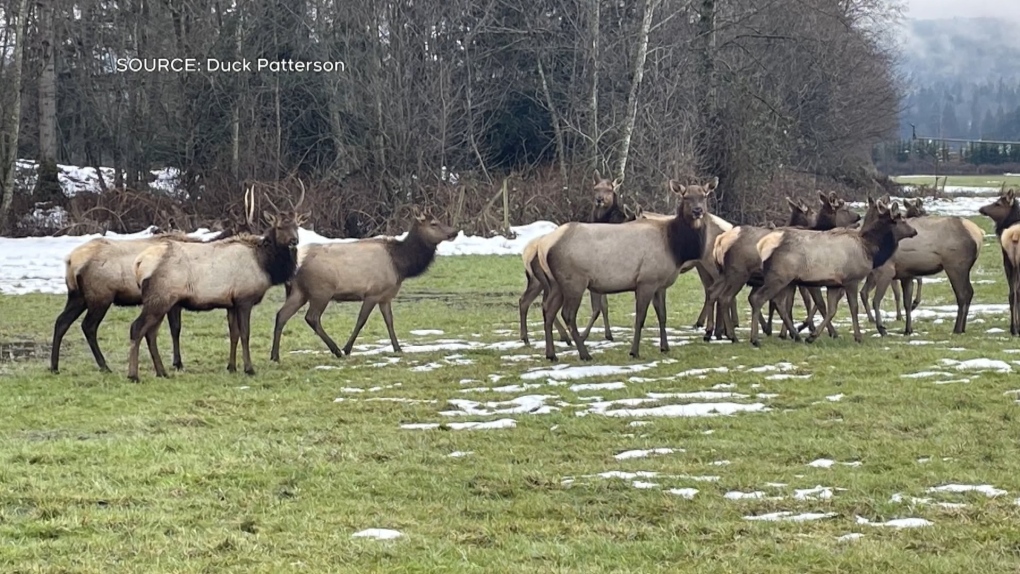Vancouver Island farmers struggle to deal with threatened elk species
 (Duck Patterson)
(Duck Patterson)
Farmers in the Cowichan Valley are losing crops and dealing with property and field damage caused by Roosevelt Elk, which have become a regular fixture on some farms in the area.
The threatened species typically moves to lower elevations during the winter months searching for more plentiful food, but in the last few years, in the Duncan area, some herds have been staying year-round on farmland.
In North Oyster, where Howie Davis has farmed cattle for more than 50 years, a herd of 12 elk showed up in December four years ago. Fortunately for him, they've so far always left by February or March.
"The herds are expanding every year," said Davis.
In the few months the elk are on the farm, Davis said they cause a lot of damage, knocking down fences, tearing the hay fields up with their hooves and eating whatever hay is growing over the winter "right down to nothing."
The elk damage to the hay fields has reduced the number of harvests from four to three in a season, said Davis.
"That’s one crop you don’t get to sell, less income," he said. "[The provincial government has] been compensating me for that … not to what it costs."
A University of Alberta research project intended to reduce human-elk conflict in the Cowichan Valley started in August 2021.
The team has set up multiple trail cameras in the valley to gather data on the herds' numbers and movements.
"To implement any sort of management strategies we need to have a good understanding of what’s happening with the population, how many are there, where are they on the landscape and how are they interacting with human infrastructure?" said Kate Rutherford, a masters student at the University of Alberta.
Rutherford says the provincial government has put a lot of effort into increasing the elk herds in the Cowichan Valley to create a healthy, sustainable population, which seems to have paid off.
"Everyone wants the population to be at healthy levels," she said.
"There’s also that balance, right, with maintaining a healthy population size but also minimizing the occurrence of human-elk conflict, which is going to increase as urbanization increases," she added.
Researchers are also planning to test deterrents to keep elk out of farms.
"We plan to broadcast predator vocalization on the perimeter of these fields where we’re currently monitoring elk using camera traps, and they will be broadcasted when triggered by animal movement," said Rutherford.
The team is also asking landowners in the area to contribute to their research by reporting elk sightings to them either through the iNaturalist app or by emailing the team directly at rooselk@ualberta.ca
The researchers hope to share their work with farmers and the provincial government as way to help with the management of Roosevelt Elk.
CTVNews.ca Top Stories

What to know about avian influenza in dairy cows and the risk to humans
Why is H5N1, or bird flu, a concern, how does it spread, and is there a vaccine? Here are the answers to some frequently asked questions about avian influenza.
'I was scared': Ontario man's car repossessed after missing two repair loan payments
An Ontario man who took out a loan to pay for auto repairs said his car was repossessed after he missed two payments.
opinion The special relationship between King Charles and the Princess of Wales
Royal commentator Afua Hagan writes that when King Charles recently admitted Catherine to the Order of the Companions of Honour, it not only made history, but it reinforced the strong bond between the King and his beloved daughter-in-law.
Man convicted of involuntary manslaughter in father's drowning, told police he was baptizing him
A Massachusetts man who told police he was exorcising a demon and performing a baptism when he shoved his father's head under water multiple times has been convicted of involuntary manslaughter in his death.
New Norad commander calls Canada's defence policy update 'very encouraging'
American troops will be spending more time training in the Far North, the new commander of Norad says, a strategy that fits 'hand-in-glove' with Canada's renewed focus on Arctic defence.
$70M Lotto Max winners kept prize a secret from family for 2 months
During a special winner celebration near their hometown, Doug and Enid shared the story of how they discovered they were holding a Lotto Max ticket worth $70 million and how they kept this huge secret for so long.
Are Canadians getting sick from expired food?
A new survey by Dalhousie University's Agri-Food Analytics Lab asked Canadians about their food consumption habits amid rising prices.
Documents reveal Ottawa's efforts to get Loblaw, Walmart on board with grocery code
It was evident to the federal government as early as last fall that Loblaw and Walmart might be holdouts to the grocery code of conduct, jeopardizing the project's success.
Charlie Woods, son of Tiger, shoots 81 in U.S. Open qualifier
Charlie Woods failed to advance in a U.S. Open local qualifying event Thursday, shooting a 9-over 81 at Legacy Golf & Tennis Club.
































